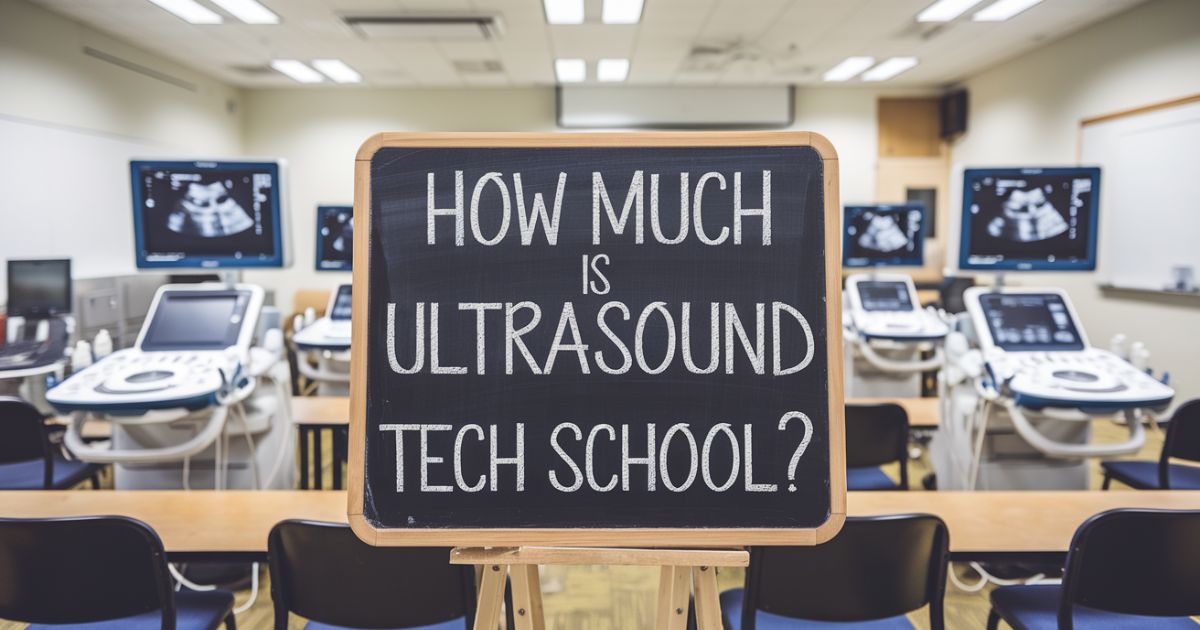Understanding Ultrasound Technology Education Costs
The journey to becoming an ultrasound technologist involves significant financial planning and consideration.
The total cost of ultrasound tech school can vary substantially depending on multiple factors, including the type of program, institution, and location.
Understanding these costs is crucial for aspiring healthcare professionals.
Program Types and Their Associated Costs
Associate Degree programs typically range from $6,000 to $40,000 for the entire course of study.
These two-year programs are offered at community colleges and technical schools, providing a cost-effective path to certification.
Private institutions generally charge higher tuition rates compared to public colleges.
Bachelor’s Degree programs can cost between $15,000 to $85,000 total.
These four-year programs offer more comprehensive education and potentially better career advancement opportunities.
The higher cost often reflects additional coursework, advanced clinical training, and expanded learning resources.
Certificate programs, designed for professionals who already hold a degree in a related field, usually cost $5,000 to $25,000.
These accelerated programs typically last 12-18 months and focus specifically on ultrasound technology.
Additional Educational Expenses
Beyond tuition, students must consider various additional costs. Textbooks and study materials typically range from $1,000 to $2,500 per year.
Clinical supplies, including scrubs and medical equipment, can add $500 to $1,500 to the total cost.
Technology fees for specialized software and equipment access often amount to $200 to $800 per semester.
Many programs also require students to purchase liability insurance, which costs approximately $100 to $300 annually.
Financial Aid and Funding Options
Federal Financial Aid
The Free Application for Federal Student Aid (FAFSA) opens doors to various federal funding options.
Federal grants, such as the Pell Grant, can provide up to $6,895 per academic year for eligible students.
Federal student loans offer fixed interest rates and flexible repayment terms, making education more accessible.
Scholarships and Grants
Professional organizations like the Society of Diagnostic Medical Sonography (SDMS) Foundation offer scholarships ranging from $2,500 to $10,000.
Merit-based institutional scholarships can cover 10% to 50% of tuition costs. State-specific grants often provide additional funding based on academic achievement and financial need.
Work-Study and Part-Time Employment
Many schools offer work-study programs allowing students to earn $2,000 to $5,000 per academic year.
Part-time employment opportunities in healthcare settings can provide both income and valuable experience.
Some employers offer tuition reimbursement programs for employees pursuing ultrasound technology education.
Read This Post: How Long Does It Take to Become a Med Tech?
Location-Based Cost Variations
Regional Cost Differences
Coastal regions, particularly in California and New York, typically have higher education costs, with programs ranging from $25,000 to $75,000.
Midwestern and Southern states often offer more affordable options, with total program costs between $15,000 to $45,000.
Urban vs. Rural Programs
Urban institutions generally charge higher tuition rates but offer more extensive clinical placement opportunities.
Rural programs might have lower tuition costs but may require additional travel expenses for clinical rotations.
Return on Investment
Salary Expectations
Entry-level ultrasound technologists typically earn $50,000 to $65,000 annually.
With experience and additional certifications, salaries can increase to $75,000 to $95,000 or more.
Specialized areas like cardiac or vascular sonography often command higher salaries.
Career Advancement Opportunities
Additional certifications can cost $200 to $500 each but significantly increase earning potential.
Advanced degrees and specializations may require further investment but typically result in higher compensation and broader career opportunities.
Hidden Costs and Considerations
Certification and Licensing
The American Registry for Diagnostic Medical Sonography (ARDMS) examination fees range from $200 to $250 per specialty.
State licensing fees vary but typically cost $100 to $300. Maintaining certification requires continuing education, costing approximately $500 to $1,000 annually.
Clinical Requirements
Transportation costs to clinical sites can amount to $1,000 to $3,000 annually.
Required health screenings, vaccinations, and background checks may cost $200 to $500.
Some programs require students to purchase their own ultrasound equipment for practice, which can cost $2,000 to $5,000.
Program Selection and Cost Management
Evaluating Program Quality
Accreditation status significantly impacts program costs and graduate outcomes.
Programs accredited by the Commission on Accreditation of Allied Health Education Programs (CAAHEP) may have higher upfront costs but often lead to better employment opportunities.
Cost-Saving Strategies
Transfer credits from previous education can reduce total program costs by 20% to 40%.
Early registration and payment plans may offer tuition discounts of 5% to 15%.
Some programs offer accelerated completion options, potentially reducing overall expenses.
Read This Post: Tip Tech Nails: The Complete Guide to Modern Nail Enhancement Technology
Long-term Career Investment
Professional Development Costs
Annual membership in professional organizations costs $100 to $300.
Conference attendance and networking events may require $1,000 to $3,000 annually.
Specialized training workshops range from $500 to $2,000 per session.
Employment Benefits
Many employers offer benefits packages including continuing education allowances worth $1,000 to $5,000 annually.
Health insurance and retirement benefits can represent an additional $10,000 to $20,000 in total compensation.
Technology and Equipment Costs
Required Technology
Personal computing equipment requirements cost approximately $1,000 to $2,500. Specialized software licenses may add $200 to $600 annually. Mobile devices and apps for medical reference typically cost $500 to $1,000.
Laboratory Experience
Access to simulation laboratories may incur additional fees of $500 to $1,500 per semester. Practice equipment and maintenance fees can add $300 to $800 annually.
Program Completion Timeline
Full-Time vs. Part-Time Study
Full-time programs typically allow completion in 18 to 24 months for associate degrees and 36 to 48 months for bachelor’s degrees.
Part-time study extends completion time but may reduce per-semester costs and allow continued employment.
Accelerated Options
Intensive programs may reduce completion time by 25% to 40% but often have higher per-semester costs. Summer sessions and interim courses can accelerate completion but may limit financial aid availability.
Future Career Prospects
Industry Growth
The Bureau of Labor Statistics projects 17% growth in ultrasound technology positions through 2029. Expanding healthcare facilities and aging populations drive consistent demand for qualified professionals.
Specialization Opportunities
Advanced specialties may require additional investment of $5,000 to $15,000 but can increase annual earnings by $10,000 to $30,000.
Emerging technologies create new opportunities for specialized practice and increased earning potential.
FAQs
What is the average cost of ultrasound tech school?
The average cost ranges from $6,000 to $40,000 for associate degree programs and $15,000 to $85,000 for bachelor’s degree programs. Certificate programs typically cost between $5,000 to $25,000.
How long does it take to complete ultrasound tech school?
Most associate degree programs take 18-24 months to complete, while bachelor’s degree programs require 36-48 months. Certificate programs for those with prior healthcare degrees can be completed in 12-18 months.
Are there financial aid options available for ultrasound tech school?
Yes, students can access federal financial aid through FAFSA, including Pell Grants (up to $6,895 annually), federal loans, scholarships from professional organizations ($2,500-$10,000), and work-study programs.
What additional costs should I expect beyond tuition?
Additional costs include textbooks ($1,000-$2,500 annually), clinical supplies ($500-$1,500), certification exams ($200-$250 per specialty), and required health screenings ($200-$500).
What is the starting salary for ultrasound technologists?
Entry-level ultrasound technologists typically earn $50,000-$65,000 annually, with potential to increase to $75,000-$95,000 or more with experience and additional certifications.
Conclusion
The total investment in ultrasound technology education varies significantly based on program choice, location, and individual circumstances.
While initial costs can be substantial, ranging from $20,000 to $100,000 or more, the career opportunities and potential return on investment make it an attractive option for healthcare professionals.
Careful financial planning, understanding of all associated costs, and exploration of funding options can help make this career path more accessible and manageable.
The combination of growing industry demand, competitive salaries, and opportunities for advancement continues to make ultrasound technology an appealing career choice despite the educational investment required.
Vividcrest admin brings expert insights in Tech and Gaming, offering up-to-date content, in-depth analysis, and trends to keep you ahead in the digital world.








